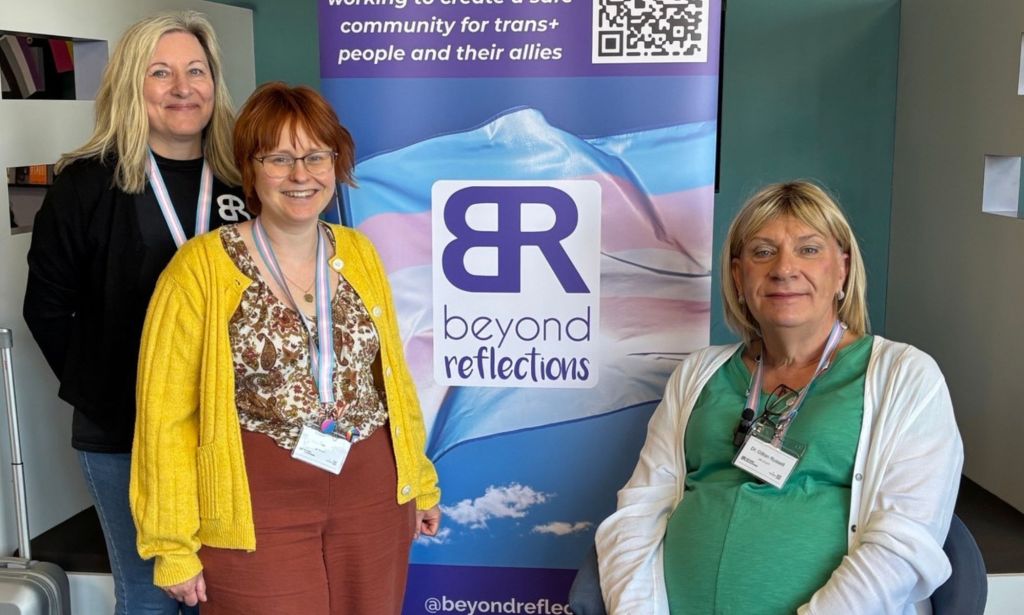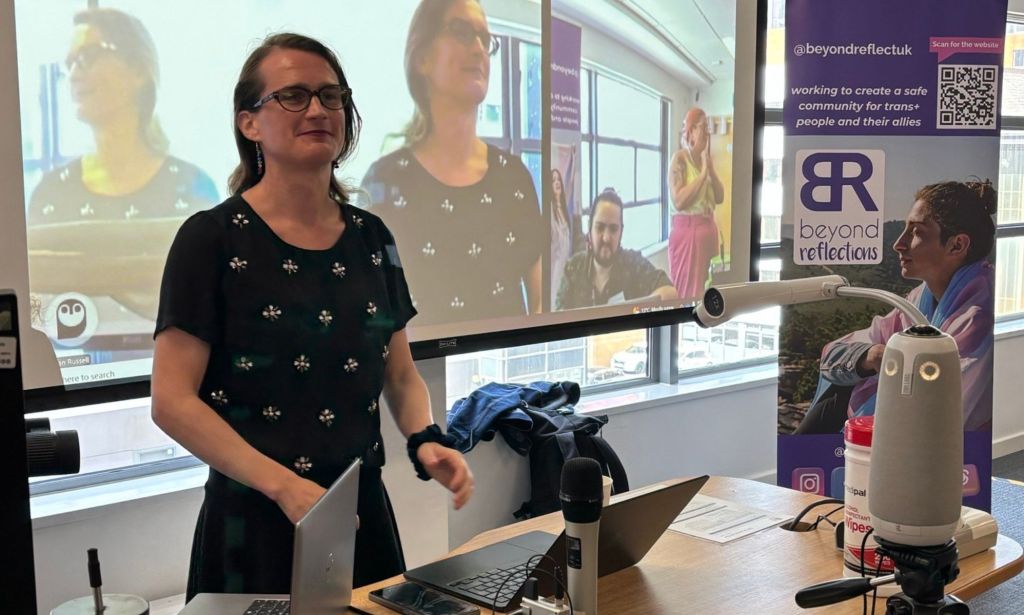 May 17 2025, 08:15
May 17 2025, 08:15 The creator of a conference showcasing the diversity of research for and by trans and non-binary people has urged academics to try and find “imaginative” ways to approach studies about the community.
Psychologist and Beyond Reflections CEO, Dr Gillian Russell, argues innovative research could act as a building block in societal understanding and acceptance of the trans community at a time when their rights are regressing rapidly.
“The point of doctorates is about how you make a contribution to learning. That’s the point of it. And if you’re doing a doctorate, that’s saying the same thing or using the same data sets or the same research part … that’s a problem.”
To help tackle this, Dr Russell, alongside Beyond Reflections, created the Trans+ Research Conference – a community-based event which aims to showcase new and innovative research for and by trans people.

She says the idea for a conference was first proposed in April 2024 following the publication of the Cass Review – an independent review into the nature of trans youth healthcare in England and Wales. The review, which has been heavily criticised by a variety of experts and institutions, made upwards of 32 recommendations to restructure the way trans youth received care, including the creation of regional hubs and a focus on ‘holistic care’.
Dr Russell says the report was their wake-up call, saying that if a review where “opinion was passed off as science” could hold such influence, then something needs to be done.
“I thought at the time it didn’t seem that we had anything that was used to rebut what was going on,” they say. “But the thing is that if you have something succinct and evidential and really punchy, that becomes what’s going on.”
Things only became more vital with the recent UK Supreme Court ruling on the 2010 Equality Act’s definition of woman and sex, which it argued related to “biological women” and “biological sex.”
Trans+ Research Conference showcases ‘young and snappy’ academics
The Conference, held at Bournemouth University (BU) on Thursday (15 May), featured a range of PhD and Masters students, established academics, and researchers hosting talks on their respective fields ranging from psychology, media studies, cancer research, and much more.
Guest speakers included Facial Feminisation (FFS) specialist Dr Angel Penedo speaking on behalf of the Conference’s sponsor, Facialteam, whose donation allowed the event to be free for all participants, as well as a panel of non-binary researchers – including Charlotte Brooks, Fraedan Mastrantonio, Katie Munday, Megan Fereday, Polly Maxwell, and Robin Skyler – who each spoke about their respective research projects.

One of the guest speakers, Feminist Gender Equality Network founder and historian, Dr Chris(tyn) Parkes, used their allotted time to discuss how legal pushback tactics originally employed by civil rights groups like the NAACP can and have been utilised by far-right actors to further discriminate against marginalised groups, including trans people.
Speaking to PinkNews following the lecture, Dr Parkes highlighted that one of the issues with historical research and academia is that, while it can be used to predict or analyse modern events, it is ill-equipped to help prevent them.
“Everything that’s happened over the last 10 years is still really fresh, and Historians aren’t really going to be equipped to sift through it and do the kind of analysis that we do, really for another decade,” they say. “By that time, more is going to have transpired and we’ll already have a different perspective on what’s unfolded.”
Making sure the range of research on display was wholly unique was, for Dr Russell, as important as ensuring that the guest speakers weren’t “the usual suspects.”
“When we got people to apply [to speak at the Conference], a lot of them were sending in their work saying, ‘I shouldn’t really apply for this. I hope you don’t mind I’m not published’ and we said ‘fantastic.’
“Our only learning curve is we might have gotten too excited and brought on a few too many people this time,” she jokes.
Trans+ Research Hub could revolutionise studies on trans people
The end goal for Dr Russell and Beyond Reflections is to create a network hub for researchers working on trans-related projects that gives them a space to share and receive feedback on data that they otherwise might not receive at the University.
Dubbed the Trans+ Network Hub, Dr Russell says they aim for the network to become a “center of excellence” for trans-related research that isn’t “frightened to break a bit of convention” and is open to collaborating with other research hubs.
“We’ve got loads of talent in terms of people doing other doctoral projects, Masters, first degrees, and students, but they’re scattered all over the country. You might have one University that has a trans psychologist or another University in the Sociology Department. We wanted to pull it all together into this network.”
Having a designated research hub for trans-related academia could, Dr Russell hopes, vastly improve not just the fundamental understanding of what it means to be trans, but also help to improve the quality of research, helping to highlight the needs of the community.

“Right now I think the problem is we’re too fragmented – we don’t talk enough to each other,” they say. “What’s happening is we’re doing the same things, plowing the same fields time after time, again and again, asking the same questions and expecting different results, and I think that’s the problem.
“We’re still asking questions like, you know, should we be paying people? I mean, that’s just not the right thing we should be talking about. We should be asking how we can create research opportunities that allow people to contribute in a completely different way, or why Universities insist that qualitative research can’t be quantitative.
“I mean, I have a doctorate myself, which is very handy because, having gone through the pain, I know what is possible, but I think when you’re a younger researcher, you’re stuck with any University structure and sometimes the University is holding research back.”
The current state of academia, Dr Russell argues, is much like being inside a hypothetical restrictive “balloon” which compresses the potential of researchers trapped inside. As those researchers begin to push against those restrictions, the space to innovate becomes larger until finally, she says, they are able to “break out” and experiment even further with methods of study.
“I get this sense we’re going to break out soon, and I think it’ll be all sorts of chaos because we’re not sure what’s on the other side, but it’s pretty exciting. We just have to get on with it.”
The post ‘Imaginative’ studies can combat transphobia, Trans+ Research Conference founder says appeared first on PinkNews | Latest lesbian, gay, bi and trans news | LGBTQ+ news.